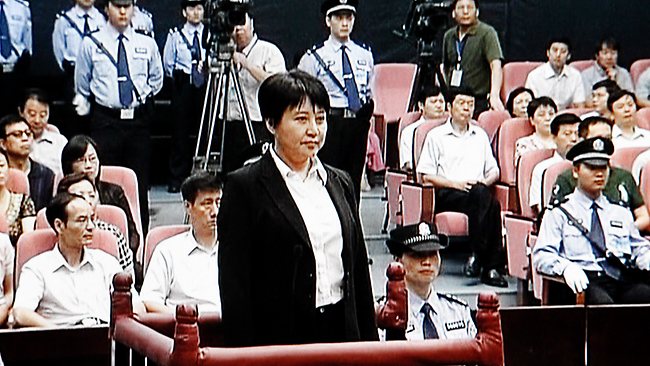murder trial of ousted politician’s wife over in seven hours
 As swiftly as it began, the trial of Gu Kailai, wife of former political leader Bo Xilai, ended in just seven hours today when she did not challenge the charges against her. She was accused of killing British businessman Neil Heywood, found dead in his hotel room in the city of Chongqing last November.
As swiftly as it began, the trial of Gu Kailai, wife of former political leader Bo Xilai, ended in just seven hours today when she did not challenge the charges against her. She was accused of killing British businessman Neil Heywood, found dead in his hotel room in the city of Chongqing last November.
Gu, a lawyer and daughter of a prominent, wealthy, aristocrat in China, reportedly confessed to the murder. A verdict will be delivered later. Gu faces up to ten years in prison or even the death penalty (though the chances of the latter are slim because of Gu’s aristocratic status).
Access to the courtroom, in the province of Anhui, was heavily restricted and closed off entirely to journalists, reports the Globe and Mail. Only two British politicians were allowed inside, out of respect for Heywood’s nationality. Information about the trial was censored over social media, particularly Sina Weibo, China’s version of Twitter. It’s a fitting end to a case that has puzzled foreign journalists and spectators for almost a year.
Months of investigation led to formal charges against Gu and an employee of the family, Zhang Xiaojun, in July. Gu first became a suspect when Chinese microblogs began circulating the rumour that she was behind Heywood’s death. Heywood’s wife Wa Lulu introduced him, a long-time resident of China, to Gu, reported the Wall Street Journal. However, some wonder whether Gu is merely being used as a scapegoat for her husband’s political career, and further doubt is cast on whether or not a fair trial should have been expected.
Bo Xilai stands accused of political corruption, abuse of power and other offenses committed while he was party leader. He is also considered too “left-leaning” to some and his gaining popularity in the political arena may have been seen as a threat to his opponents. He was fired as Chongqing party leader in March.
Haywood’s death has been surrounded by mystery, speculation, and political controversy. The cause of death was ruled alcohol poisoning – despite not being known, to friends, as a heavy drinker. His family was then told it was a heart attack, but he was cremated without an autopsy. Gu and Xiaojun are convicted of poisoning Heywood via a glass of water he drank while already intoxicated.
Shortly after his death, the case became more about maintaining the grip of communism in China (for that country at least) than solving Heywood’s death. The high-profile trial is a distraction from allegations of corruption in Chinese government as the country begins a political transitional phase, to be completed in October.
In February, less than three months after Heywood was found in his hotel room, an ally of Bo’s, Wang Lijun became caught up in rumours that he was under investigation for corruption. By 9 February the rumours were confirmed. Bo appeared in a press conference in March defending himself and his family against the allegations of corruption, refusing to resign, and condemning his detractors for maligning his family’s reputation.
In the days following Bo’s comments at Congress, the usually hush-hush infighting of Chinese government became a public spectacle. Chinese premiere Wen Jiabao held his own press conference and criticised Bo. A day later, Bo was dismissed as party leader.
Rumours of Gu’s involvement begin a week later and the British government stepped in to demand a thorough investigation. The pace of the “investigation” and the allegations themselves are suspicious, and the odds seemed stacked against Gu from the beginning. The motive behind the murder remains unclear. Some cited a breakdown in business dealings between Heywood and Bo. Others alluded to an illicit affair. More still believed Gu killed Heywood after he threatened the life of her son, also named Bo, a soon-to-be graduate of Harvard University in the United States.
The evidence against them has rarely, if ever, been discussed. While it is clear they knew each other and worked closely, little else has been reported connecting Gu to Heywood’s death. Despite this, Chinese newspaper Xinhua reported there was ‘irrefutable and substantial’ evidence against both suspects. And with the courtroom restricted, and the trial over in less than half a day, that “evidence” will remain behind closed doors. The Globe and Mail also reports that Gu’s appointed lawyer had little experience defending murder charges. He is a specialist in financial law.
The British government raised concerns that the trial would be tainted by political interference but it appears those concerns went unaddressed. Though Heywood is British, the case was handled completely by Chinese authorities, tried in a Chinese courtroom and subjected to Chinese law. Prime Minister David Cameron agreed to complete cooperation with the Chinese government but it seems little was asked of him.
It helps, as well, that both countries are preoccupied with the Olympic games at the moment. With Great Britain hosting and China dominating, the citizens of both countries won’t be devoting nearly as much time or energy on ensuring a fair trial for Gu or justice for Heywood.
And Gu is not the only woman being used for the political gain of men. Popular Chinese actress Zhang Ziyi (Memoirs of a Geisha, Rush Hour, Crouching Tiger, Hidden Dragon) was accused of being paid for sex with Bo Xilai. Ziyi denied the rumours – which alleged she’d been paid over $10 million for sex with Xilai – but the damage was done. She’d become the latest victim of the campaign against the once prominent political figure.

